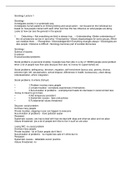Samenvatting
Summary Introduction to Sociology (410120-B-5)
- Instelling
- Tilburg University (UVT)
Summary Introduction to Sociology; with pictures and examples Must state that it is not written and structured in the best way but it does include all that was mentioned and I got a pretty good grade for this course.
[Meer zien]




